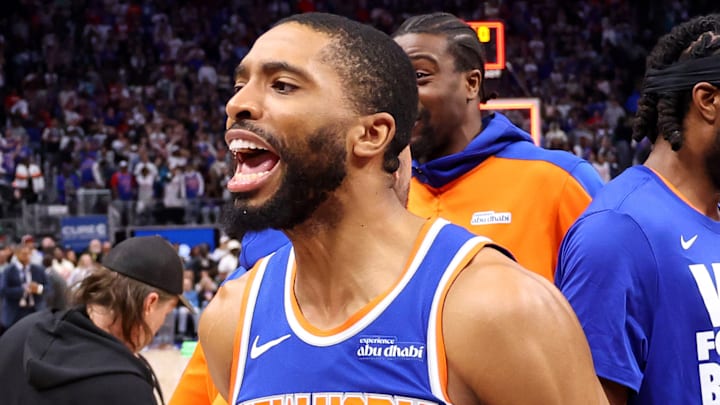So much is at stake for the New York Knicks as they enter the 2025 offseason. Too much, arguably. The number of questions facing the tippy top of this roster are uncomfortable, maybe even alarming.
Yet, while a lion's share of speculative brain power is being devoted to the future of Karl-Anthony Towns, the Knicks have another $150-plus million issue they need to tackle before anything else: The Mikal Bridges extension.
The 28-year-old will be eligible to sign a four-year, $156.2 million deal that takes effect after next season, beginning in 2026-27. Despite many already feeling buyer’s remorse for the blockbuster trade that brought him over from the Brooklyn Nets, the Knicks are absolutely going to offer the extension. It isn’t because they will feel obligated because of how much they gave up to get him, either. (As a reminder, he cost five first-rounders, and one first-round swap). It is the financially responsible thing for them to do.
No, the decision here is actually Bridges’ to make. And his choice will have ripple effects that reverberate throughout the rest of New York’s roster—not just in 2025-26, but beyond.
Mikal Bridges has (tens of) millions of reasons to wait for free agency
For as frustratingly inconsistent as Bridges has been at both ends of the floor since joining the Knicks, a four-year, $156.2 million extension is more team-friendly than not.
Shelling out roughly 20 percent of the salary cap for a higher-end two-way wing who can, on many nights, play the part of a viable No. 3 is something for which virtually every other team would sign up. Especially when considering how much Bridges could command in free agency.
If he hits the open market in the summer of 2026, he would be eligible for a starting max salary of just over $51 million. That is a huge difference compared to the $34.9 million he would get in Year 1 of the extension.
Plenty of reasonable minds will claim that no team is giving him that much. They are wrong. Nearly half of the league has a realistic path to more than $50 million in cap space next summer. That number will shrink as teams spend money this offseason, but the 2026 landscape is still going to be frothier than the current field, which counts the Brooklyn Nets as the only squad with actual cap space.
Bridges might be a flawed player, particularly if, like the Knicks, you acquire him with the intention of him ascending into second-option territory. But wings with his skill set are in ultra-demand. A max deal in 2026 from another team projects to be worth $219.4 million over four years. And while he might not get the full boat, he will almost assuredly get most of it, making him much more expensive.
Mind you, this presumes the Knicks simply just have to match the market. They may need to include a fifth year that only they can offer. A five-year max for Bridges would run $296 million. He definitely isn’t getting that, but the overarching point stands: Extending him this summer means he will cost $156 million from 2026-27 through 2029-30. If he hits free agency, that total dollar amount is rising above $200 million.
The Knicks need Mikal Bridges to sign an extension
The Era of Aprons is complicated and punitive, and fans shouldn’t have to think too hard about the minutiae of all. Here’s what you actually need to know: The longer talented scores stick together, the more likely they are to enter the dreaded second apron, and either get broken up or boxed into unnavigable corners.
If the Knicks have to sign Bridges in 2026 free agency, they will be staring down the barrel of second-apron life when factoring in other moves. But if he signs the extension, they will be a projected $30 million below the first apron, according to ESPN’s Bobby Marks. That is a big friggin’ deal. It buys the Knicks time and flexibility other contenders won’t have.
And so, this raises the question: Will Bridges sign the extension, or will he enter free agency? Tons of people believe he’ll put pen to paper on the deal. It is considered part of the calculus behind mortgaging the future for him. New York overpaid in assets to get someone willing to follow in the footsteps of Jalen Brunson, and sign a below-market deal.
For the Knicks’ sake, they better hope this is exactly how it all plays out. Because if he doesn’t sign the extension, they will be forced to think about trading him or someone else—not on their own terms, but because he’ll either be a flight risk, or the symbol of a core becoming untenably expensive.
